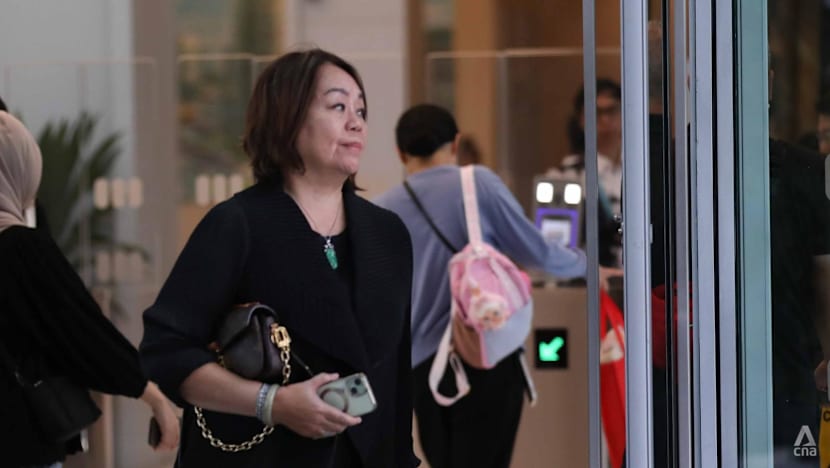'Hyflux - SELL', read analyst report after Tuaspring project win announced, deduced it hinged on power sales
The analyst also called the then-head of Hyflux's corporate communications and concluded that the bulk of the electricity had to be sold to the merchant market.

(From left): Hyflux founder Olivia Lum, her lawyer Senior Counsel Davinder Singh and Hyflux's former head of corporate communications Winnifred Heap Ah Lan at the State Courts on Aug 21, 2025. (Photos: CNA/Marcus Mark Ramos)

This audio is generated by an AI tool.
SINGAPORE: Amid "buy" recommendations from analysts after Hyflux announced its Tuaspring project winning the PUB tender for a desalination plant, one relatively obscure Indian analyst proposed that investors sell the company's stock.
This was while deducing that the bulk of the electricity generated by the new power plant in Hyflux's Tuaspring project would have to be sold to the grid to achieve its profit targets.
This was revealed in court on Wednesday (Sep 10) by Hyflux founder Olivia Lum Ooi Lin's lawyer as he wrapped up his cross-examination of prosecution witness Winnifred Heap Ah Lan, who headed corporate communications for Hyflux at the time the company was bidding for the PUB tender in 2010 and 2011.
The Indian analyst's report is significant as it potentially shows that at least one analyst was aware of the importance of the electricity sales to the profitability of the project.
Lum, 64, is accused of omitting the following information as Hyflux director and CEO in an offer information statement to potential investors and in an announcement to the Singapore Exchange:
- That Tuaspring project was Hyflux's expansion into a new business of selling electricity
- That revenue from the sale of electricity was projected to make up the significant majority of the project's revenue
- That the profitability of the Tuaspring project was contingent on revenue from the sale of electricity from the power plant
Lum is on trial along with former chief financial officer Cho Wee Peng, 56, and four other former Hyflux independent directors.
The prosecution's case is that Hyflux portrayed its Tuaspring project primarily as a desalination plant when seeking funds from investors, when it hinged on the sale of electricity from a power plant it was building to power the desalination plant.
The fact that it was venturing into the electricity business for the first time, with accompanying risks, was allegedly not disclosed to the public, and the company eventually entered liquidation after suffering massive losses on the back of a weak power market.
ANALYST REPORTS
Senior Counsel Davinder Singh on Wednesday took Ms Heap through various analyst reports. Ms Heap was an analyst before joining Hyflux in 2009.
The reports were dated Mar 8, 2011, a day after Hyflux announced it won PUB's tender.
Most of the reports recommended "buy" for Hyflux stock because of the new Tuaspring project, valued at S$890 million.
However, one analyst from a firm called IIFL took a day to come up with an analysis headlined "Hyflux - SELL", Mr Singh showed.
In the report, flashed on screen, the analyst wrote: "We believe the power plant capacity exceeds the requirement of the desalination plant and Hyflux will have to undertake merchant sales of at least 65 per cent of its spare power capacity to achieve its low-teen equity IRR target for the project."
IRR refers to the internal rate of return, and low-teen IRR refers to the IRR of 10 to 14 per cent – considered a positive but modest growth rate often seen in conservative or lower-risk investments.
While the analyst raised the target price for Hyflux from S$1.60 to S$1.79, he retained the sell rating, "due to a lack of visibility on future order book" or future projects by Hyflux.
The report went on to say that an estimated 87 per cent of the power plant's capacity – or 358MW of the 411MW – would be available for merchant sale, and that Hyflux would have to sell at least 65 per cent of this excess power capacity into the grid to achieve its profit targets for the project.

When questioned, Ms Heap said this analyst appeared not to be part of the usual players and may or may not have been invited to a briefing for analysts on Mar 7, 2011, the day of the announcement of the project win.
She added that the analyst's firm did not appear to be local.
Mr Singh showed Ms Heap an email that she had sent to Lum and Cho around the time of the announcement, with the subject "Indian analyst". In her email, she said the analyst "called again".
"Basically he did his calculations and came to conclusion that; we only need about 60MW, therefore the bulk needed to be sold to the merchant market. Also he reckoned that it would be difficult for us to get teens IRR if we didn't sell to the grid," wrote Ms Heap in her email.
She added that the analyst also wanted to know how Hyflux would be "recognising our power revenue", to which she told him that both plants were integrated under one project and one special purpose vehicle.
She added that she had highlighted to the analyst that "power is an expansion of our water strategy and very integral" and therefore "should not be viewed in isolation".
Mr Singh took Ms Heap through other analyst reports that recommended "buy" for Hyflux stock, including reports from DBS Group Research Equity and Kim Eng.
One report by JP Morgan stated that the sale of excess power would be much more than half of the power generated by the power plant, indicating that the analyst was aware of the power generation aspect.
After Mr Singh concluded his cross-examination of Ms Heap in the late morning, Mr Thong Chee Kun from Rajah & Tann briefly cross-examined her on behalf of his client, Cho.
Mr David Chan from Shook Lin & Bok, who represents the remaining four independent directors, will conduct his cross-examination on Wednesday afternoon. After this, the prosecution will do a brief re-examination of Ms Heap.
The next witness to take the stand is from PUB. His evidence will be entirely in camera – in private – for reasons of national security concerning water prices.
If convicted of consenting to Hyflux's intentional failure to disclose the electricity sale information to the securities exchange, Lum could be jailed for up to seven years, fined up to S$250,000 or both.
For making an offer of securities to the public with omissions about the electricity sales, she could be jailed for up to two years, fined up to S$150,000, or both.














